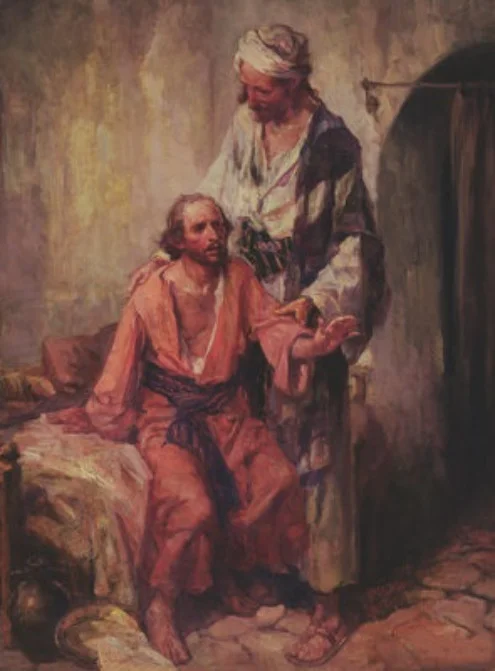“For some say, “His letters are weighty and forceful, but in person he is unimpressive and his speaking amounts to nothing.””
Those are Paul's words in his second letter to the Corinthians. He's responding to hurtful words and criticisms that have filtered back from some in Corinth. He quotes them merely to reinforce his message in Chapter Ten of that letter summed up in the last verse: "For it is not the one who commends himself who is approved, but the one whom the Lord commends."
Paul was gifted
sharp in intellect, well educated, and passionate. But the Damascus Road changed him forever.
Until then his schooling, his natural gifts, his status in the Jewish community as a rising star served him well. He was spearheading the persecution of a sect not yet called Christian. His methods were thorough, brutal, and carried the authority of the temple in Jerusalem. He was a servant of God intent on doing His will by all the means at his disposal. And he was ignorantly, defiantly, spiritually, completely wrong, misguided and deceived!
So when Saul's ( his name before he was known as Paul) lurching horse threw him to the ground and he heard the voice of Jesus asking why he was persecuting his disciples, he was distraught. Struck blind he was led into Damascus where he sat for three days without eating, shaken to the core of his being. So sincere, so wrong, so passionate, so misguided, so sure, so confused, so brave, so scared.
Then Ananias came to visit, laid hands on him and his eyes were opened along with a good news/bad news prophetic word. "This man is my chosen instrument to proclaim my name to the Gentiles and their kings and to the people of Israel. I will show him how much he must suffer for my name." (Acts 9:15-16)
Never again would Saul/Paul display such arrogance and brash self-assurance. He learned humility the hard way and the lesson went deep. He writes in Galatians that at least 17 years later he traveled up to Jerusalem to meet with 'those esteemed as leaders'.
The reason? "I presented to them the gospel that I preach to the Gentiles. I wanted to be sure I was not running and had not been running my race in vain." (Galatians 2:2)
"I wanted to be sure..."
Paul had learned that he could be wrong no matter how sincere his thoughts, or how passionate his resolve and feelings. Checking in with others in leadership is a core value in mature Christian circles, because being teachable and humble are the DNA hallmarks of the character of Jesus and the presence of the Holy Spirit.
In another letter, this time to the Philippians, Paul writes eloquently about humility: "Do nothing out of selfish ambition or vain conceit. Rather, in humility value others above yourselves, not looking to your own interests but each of you to the interests of the others." (Philippians 2:3)
Humility is a fruit of God's Spirit that only others can 'taste and see' - in us. We dare not declare it for ourselves because then it becomes pride in the twinkling of an eye. Humility looks like a willingness to listen and learn, considering other viewpoints, having the demeanour of a servant, being gracious with questions and criticism, and being self-aware. It does not 'fear man' because it's identity and confidence is rooted in the love, grace, forgiveness and acceptance of God the Father. Humility is powerful, disarming, extremely attractive, and not as common as one might think.
Humility-light, though, seems plentiful in supply. It masquerades as the 'real thing' but is only skin deep. It peels off in huge chunks when under pressure (questioning, criticism, disagreement, challenges) revealing the ugliness of self-interest, religion, a victim mentality, an orphan spirit, and a host of other flesh-eating maggots.
One of the most effective ways to nurture humility is look hard and listen more. Look at your reflection in the mirror without make-up and new clothes. Remove the plank out of your own eye before fixating on the speck in someone else. Value conversations. Actively listen by asking questions, be open to new perspectives, and entertain the likelihood of 'not always being right or knowing the whole story'. That does not mean having no strong views, or not being passionate, or being wishy-washy. Paul would have none of that.
Humility embraces the good, the bad, and the ugly in our lives, in our history, and in our flawed and ever-deepening characters. Paul never hid his scars. This gash on my forehead is where I was thrown off my high horse, hit the Damascus road and encountered the risen Lord Jesus. My back is a mess, twisted and scarred from flogging in prison. This limp I walk with is from the shipwreck where no one drowned. My wrists are weak from the chains fastening me to my guards. This scar on my hand is from a snakebite on the beach in Malta. There are some scars invisible to your eyes. They're in my heart and mind when I persecuted the early church.
Why do I display these wretched markings on my broken body? Because God's Spirit assured me that.... 'My grace is sufficient for you, for my power is made perfect in weakness.' Therefore I will boast all the more gladly about my weaknesses, so that Christ's power may rest on me." (2 Cor. 12:9).
If you looked for humility on the Antique Roadshow it would be the piece of wooden furniture covered in nicks, scratches and years of use (and abuse). It would be well oiled and have a deep rich sheen to be admired. The 'Expert' would rub her hand on the surface and praise the patina and character of the item. Despite the wear and tear the craftsmanship would stand out as magnificent, skilled, and of the highest quality. The same is true for Paul. Behind his many battered scars the hand of God is so very evident.
We could place an identical item of furniture, with a similar history and age, next to the one described above. Except this one's been 'restored'. Meaning every blemish has been sanded away, it's been painted or lacquered 'to look like new'; to deny or hide the history. The Expert almost passes by in dismay. "All the character's gone, what a shame. The value and appeal has been significantly diminished by an over-zealous restorer."
Which piece of
furniture are you?
The most authentic testimony to God's healing and deep restoration in our lives is when we too can boast of our weaknesses (and failures) in order to demonstrate the depth and breadth of His power and grace. We're by no means proud of some of our history, but He reached down and took hold of our mess and redeemed and restored it. We are no longer crippled by that past or trying to hide the ugliness. We embrace it all because we are no longer slaves, not dwelling in regret and shame. We are disciples with scars that remind us that when we're weak He is present, strong and faithful.
When we've received and experienced that measure of grace, humility is easy... and we delight to pay it forward.
“In your relationships with one another,
have the same mindset as Christ Jesus:
Who, being in very nature God,
did not consider equality with God
something to be used to his own advantage;
rather, he made himself nothing
by taking the very nature of a servant,
being made in human likeness.
And being found in appearance as a man,
he humbled himself
by becoming obedient to death—
even death on a cross!
Therefore God exalted him to the highest place
and gave him the name that is above every name,
that at the name of Jesus every knee should bow,
in heaven and on earth and under the earth,
and every tongue acknowledge that Jesus Christ is Lord,
to the glory of God the Father.”





